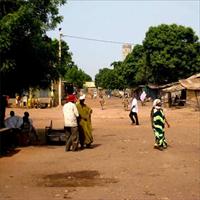GUINEA: Reputation for corruption worsens

Guinea fell five spots in the 2008 ranking of perceptions of corruption released by the watchdog non-profit Transparency International (TI). Officials say Guinea’s deteriorating reputation for corruption can threaten city services, choke economic growth and increase drug trafficking.
Guinea’s TI representative, Mamadou Taran Diallo, told IRIN Guinea is paralysed in its efforts to wipe out corruption. “Guinea’s rank at 173, tied with Chad and Sudan, out of 180 countries is a clear and persistent sign our country is stuck at the bottom.”
Guinea ranked last year 168 out of 179 countries, which was a slight improvement over 2006 when Guinea was perceived to be the fourth most corrupt country in the world. “We need to move past talking about fighting to corruption to actually doing something.” said Diallo.
Director of the non-governmental organisation, Guinea Agency for Transparency, Diallo is calling on the government to publicise high-ranking officials’ salaries, internal audit results and fraud probes.
Corruption agency wants more independence
The executive director of the government-appointed national anti-corruption agency, Mohamed Francois Falcon, told IRIN Guinea’s low rank is because of disruptive nationwide strikes in 2007 that shuttered businesses and paralysed governance. “People chased governors [and other officials] from their posts.”
In January and February 2007, demonstrators clashed with security forces in deadly protests against President Lansana Conte’s release of allies detained on corruption charges, and cost-of-living increases.
Falcon says the tumult did not subside with strike-ending appointment of the now-ousted Prime Minister Lansana Kouyate on 26 February 2007. “No ministry was able to form its cabinet so the old guard continued to exercise power."
"Guinea’s lower rank is because of the dysfunctional administration [during this period], the weak judiciary, and embezzlement. The government is looking into what actions it will undertake to improve its position,” said Falcon.
But Falcon says his agency is hampered by the government’s lack of political will and its own lack of independence. “To be able to really fight corruption, there has to be a total divorce between this agency and politicians, notably, the executive branch of the government.” He added the Ministry of Justice has not yet responded to any of the agency’s fraud investigations.
Nevertheless, Falcon told IRIN he is helping to draft the government’s anti-corruption law to be presented soon to the legislature. “All over the world, when the justice system does not work, corruption will spread. This is the case in Guinea.”
Impunity reigns
Increasingly, traffickers have taken advantage of Guinea’s poorly-staffed and ill-prepared justice system and easily-compromised public officials to transit drugs through Guinea to other West African countries, and on to Europe.
The UN anti-crime chief for West Africa, Antonio Mazzitelli, told IRIN that even though Guinea has not yet had major drug seizures like some of its West African neighbours, the UN Office on Drugs and Crime has evidence drugs are stealthily moving through the country.
“When you hear about a big seizure, that is when traffickers make a mistake, or it is already the end of [a long period] of trafficking. We know drug couriers are sneaking out smaller quantities of drugs from Conakry to other parts of West Africa. Drugs are definitely passing through Guinea,” confirmed Mazzitelli.
Law professor Barry Saifoulayue from Sonfonia in Conakry said for the right sum, traffickers buy impunity. “To avoid any risk of arrest or imprisonment…it is enough to have the protection of a high-ranking army captain who will lend his help at any moment. That is the case with certain drug traffickers…because no one dares arrest them.”
The law professor said corruption in Guinea is viral, deadly and contagious, “Corruption is the AIDS [virus] of our economy.”
Dim outlook at 50
Residents in Conakry have told IRIN the tentacles of corruption have choked off water services, disrupted electricity and relegated health care to a service-for-bribe system.
David Camara, a management student at Conakry’s University of Gamal Abdel Nasser, told IRIN he has little hope the national anti-corruption agency can change the government, or improve city services.
“Competent companies and individuals who can carry out projects are often brushed aside because they are not ready to pay bribes. So this leaves us with poorly-constructed roads and buildings, managed by incompetent people. With this corruption, Guinea continues to live with the unbearable [consequences] of underdevelopment, as it enters a week [of festivities] to celebrate 50 years of independence.”
Guinea observes on 2 October 50 years of independence from former colonial power France.
 Back and Next - Back and Next
Back and Next - Back and Next See Also - See Also
See Also - See Also